#shadhili
Explore tagged Tumblr posts
Text
Istighfar Kabir Sayyidi Ahmad Ibn Idris Al Hasani
Di dalam halaman muka buku wird kami ada formula wird yang ditambahkan oleh mursyid kami Shaykh Moulay Hashim Al Belghiti, formula wird itu disebut Al Azimiyya atau Istighfar Al Kabir dari Sayyid Ahmad Ibn Idris Al Hasani, yang penjelasannya sebagai berikut: Allah Subhanahu wa ta’ala berfirman, Maka aku katakan kepada mereka: “Mohonlah ampun kepada Tuhanmu, sesungguhnya Dia adalah Maha…
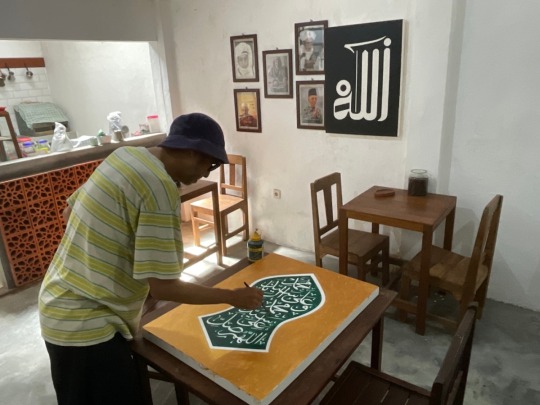
View On WordPress
0 notes
Text
Kupwara: An abode of Sufi Saints-Khursheed Dar (Pohrupeth langate)
Kupwara is among those few districts of Jammu and Kashmir that are blessed in many ways. Apart from the sheer natural beauty that Kupwara district possesses, the district also has a rich heritage and culture. The diversity that this district possesses in the form of various tourist sites, pertaining to different facets of history, religion, and culture is phenomenal. One aspect of this diversity…

View On WordPress
#army of God#chishti#kashmiri spiritual circle#kashmiri sufism#kupwara shrines#naqshbandi#owaisi#Qadiri#qubravi#Quran#saints of kashmir#shadhili#shazili#shorawardi#shrine of kashmir#shrine of kupwara kashmir#soharwardi#spiritual persons in kashmir#spirituality in kashmir#spirituality of kashmir#true Sufis#who are sufis
0 notes
Text
this album is one of my favorite jazz albums released in my lifetime, it’s very beautiful and powerful, lotta range
12 notes
·
View notes
Text
Sufism in the Philippines
Bismillahir Rahmanir Rahim In The Name of Allah the Most Gracious the Most Merciful
Allahumma salli `alaa Sayyidinaa Muhammadini ‘l-faatihi limaa ughliq, wa ‘l-khaatimi limaa sabaq, naasiri ‘l-haqqi bi ‘l-haqq, wa ‘l-haadi ilaa Siraatika ‘l-Mustaqeem, wa `alaa aalihi haqqa qadrihi wa miqdaarihi ‘l-`azheem. O Allah, bless our Master Muhammad, who opened what was closed and sealed what was before. He makes the truth victorious by the truth and he is the guide to Your Straight Path. And bless his Household as it befits his immense stature and splendor.
Allahumma inni as-aluka fahmal-nabiyyen wa hifdhal mursaleen wal malaaika al-muqarrabeen. O Allah! I ask You for the understanding of the prophets and the memory of the messengers, and those nearest to You.
This paper aims to expound on Sufism, it’s concepts, history in the Philippines and Muslims who are antagonist of it.
Sufism, also known as the science of Tasawwuf, has many meanings attached to it both by its practitioners and enemies. It is widely known definition came from two root words which are Safa or Purity and Suwf, referring to a wool cloth. In simple terms, Tasawwuf is the science of Ihsan and purification of one’s self for the love of Allah. It involves certain Tariqas, practices and litanies. The counterpart of Tariqas in the catholic faith are the spiritual orders like the Jesuits,Franciscans and Dominicans. Many tariqas now exist in the Philippines with their respective followers scattered around the country. Despite of their peace-loving nature they have been subject of abuse from the Wahhabis.
Contrary to what the enemies of Tasawwuf believe, Sufism is not a sect in Islam. It is one of the Islamic sciences and a treasure of the Muslim Nation. Most of the Sufis are Sunnis while only minority of Shias claim to be affiliated to it. As Sayyiduna Shaykh Muhammad Adil Rabbani, the spiritual leader of the Naqshbandi Aliya path, said: “Sufism is the essence of Islam.” It is also important to understand that the terms used by Sufis did not exist in the time of the Prophet Muhammad alayhis salatu was salam yet its essence already existed since his time. One of these terms is Tariqa which is an Arabic word for path,way or order. The Sufi masters have emphasized the importance of following a Shaykh and a path from their saying “Whoever does not have a Shaykh, his shaykh is shaytan.” Non-Muslims would relate more to Tariqa if we translate it to mean as spiritual order. There have been many tariqas that existed throughout the Islamic history but now there are only 41 major tariqas. The 4 acknowledged by many scholars as the main tariqas are the Naqshbandi,Qadiri,Shadhili and Chisti.
In these different tariqas, certain practices and litanies are done by the mureeds as recommended by their Murshids. These involves voluntary ritual acts of worship, prayers upon the Prophet Muhammad alayhis salatu was salam, remembrance of Allah and litanies of the saints. Along with these remolding one’s character to be in line with the prophetic character is also done. This actions are in reference to the Hadith Qudsi: My servant continues to draw near to Me with voluntary acts of worship so that I shall love him. When I love him, I am his hearing with which he hears, his seeing with which he sees, his hand with which he strikes and his foot with which he walks. Were he to ask [something] of Me, I would surely give it to him…” Hadith Qudsi (Sahih al-Bukhari, 81:38:2), And the Ayah: Qul ateeAAoo Allaha waalrrasoola fa-in tawallaw fa-inna Allaha la yuhibbu alkafireena( Say: “Obey God And His Apostle”: But if they turn back, God loveth not those Who reject Faith.) 3:31. Some known practices of Sufis in our country are Mawlid, Gatherings for Isra wal Mi’raj, Reciting surah Yasin on Nisfu Sha’ban, Visiting the graves of the pious ones and Tahlil Arwah. These practices have been preserved until now despite the increasing adherents of Wahhabism who are very antagonistic of it claiming these are non-Islamic practices.
Sufism arrived to the country with the arrival of the Sharif Sab’ah or Lumpang Basih. These were the Sufi missionaries who brought Islam to the Philippines. Since then some concepts of Tasawwuf became mixed with the existing spiritual beliefs of the people in the south. These led to the development of Indigenous Islam or Ilmuh kamaasan. It is best described by Professor Yusuf Morales as “an indigenized amalgamation of Islam from the preceding schools of thought and local cultural customs. This is actually contextualized and simplified according to how the elders have understood Islam and the process of Islamization of the communities.” This, in turn, became a treasure of the Moro culture and tradition. Among the Tausugs of Sulu, it became a heirloom for the succeeding generations.
Accordingly, Ilmuh kamaasan is so wide and each family or master of it possesses a unique part of it. Nowadays, there’s a decline of its practitioners mainly because of two reasons: The growing numbers of Wahhabis who declare it as Bid’ah or Shirk and the immaturity of the present generation to carry such special knowledge. According to Sayyiduna Shaykh Khaled Abou El Fadl the rise of the Wahhabi ideology was due to the wealth of Saudi Arabia and retreat of the very rich cultural elements in the Islamic tradition like the Turks, Malays and Filipinos from the mainstream picture. This is because the nuance that they brought to the picture and the traditions of spirituality are remarkably rich nuances
There are already many practitioners of Sufism in the country coming from different social status. The Tariqas that are present in the country are the Naqshbandi Aliya, Naqshbandi Chisti, Qadiri, Rifai, Shattari, Rifai Qadiri Shadhili, Tijani and Khalwati. Among them the Naqshbandi Aliya tariqa have the most followers which are in Manila, Cebu,Zamboanga, Sulu and Tawi-Tawi. The ameer of the Naqshbandi Aliya tariqa in the country is Sidi Khalid Ismael and there are also separate Kadeems for the different areas. Some of the Sunni scholars from Temboro are Naqshbandi Chistis. There are also Sufis from the students and alumnis of known universities like the ADMU, ADZU and WMSU.
The Sufis and the science of Tasawwuf was widely accepted by Sunnis in the country. However, with the rise of Wahhabism, there are already many Muslim Filipinos who are against it. This is primarily due to the misconceptions, lies and fabrications of the Wahhabis. They labeled Sufis and Sufism as either Kafir,Mushrik or Bid’ah. This is not surprising since Muhammad Ibn Abdul Wahhab along with the Wahhabi scholars after him committed many atrocities to the Sufis. Some of these were the desecration of the graves of the Saints, abuses to the Sufis and murders of Sufi masters. Even the ISIS killed many Sufi scholars in the places they have invaded. The Wahhabis and Salafis have this audacity to speak of Tasawwuf when they have not even a single knowledge of it. These arises from the bigotry and zealotry they have engrossed themselves with.
To illustrate a point of what was stated, let us refer to a simple analogy. Common sense would dictate that if you need to consult someone of a sickness you have you would go to a doctor and not an engineer, likewise, if you need to consult someone for constructing a building you would go to an engineer and not a doctor. Additionally, even someone would read all the books of a certain field of study this would not qualify him to speak of it without its proper understanding. Information and knowledge are different things, especially in our present time wherein most are overwhelmed by information yet deprived of true knowledge. Knowledge, Understanding and Practice are also distinct from each other. One may possess one but be deficient of the two. In the science of Tasawwuf, practice and experience are the core of it. One is not a Sufi if he has not tasted nor experienced the secret of this exalted science. Therefore, non-Sufis should refrain from talking about Tasawwuf, be humble enough to its practitioners, conquer their zealotry as well as their bigotry and prove their claim that they only wished for the well-being of the Muslims.
This should make us realize of the value of Sufism in our country and our present situation today. Sufism, the essence of Islam, which is based from the love of Allah and the Prophet Muhammad alayhis salatu was salam is effective for countering and preventing violent extremism. There have been no Sufi who became a terrorist and called for the killing of their brothers in humanity. The Sufi masters have always highlighted ,both in practice and in teaching, that Sufis should be of service to God’s creation. They have also been good exemplars for tolerance and compassion to everyone despite the differences and flaws we all have. It would also be beneficial in the character reformation of our youths today. This would improve their Adab to everyone, especially to their families which is the foundation of our community. This would then lead to the improvement of our society.
WAllahu Wa Rasuluhu A’lam Allah(awj) and His Messenger alayhis salatu was salam knows best!
The writer is but a dust in the feet of the Prophet Muhammad alayhis salatu was salam, The Prophet’s Ahlul Bayt, The Prophet’s Companions,The Salafus Salih,The Friends of Allah, the Righteous Scholars of Islam and Shaykh Muhammad Adil Rabbani
WAllahu Wa Rasuluhu A’lam Allah(awj) and His Messenger alayhis salatu was salam knows best!
`Alaa ashrafi ‘l-`alameena Sayyidina Muhammadin salawaat.
`Alaa afdali ‘l-`alameena Sayyidina Muhammadin salawaat.
`Alaa akmali’ l-`alameena Sayyidina Muhammadin salawaat.
Salawaatullaahi ta`alaa wa malaa’ikatihi wa anbiyaaihi wa rusoolihi wa jami`ee khalqihi `alaa Muhammad wa `alaa aali Muhammad `alayhi wa `alayhimu ‘s-salaam wa rahmatullaahi ta`alaa wa barakatuh.
Wa radi-Allahu tabaraka wa ta`alaa `an-saadaatinaa as-haabi rasoolillaahi ajma`een. Wa `ani ‘t-taabi`eena bihim bi-ihsaanin, wa `ani ‘l-a’immati ’l-mujtahedeen al-maadeen, wa `ani ‘l-`ulamaai ’l-muttaqeen, wa `ani ‘l-awliyaai ‘s-saaliheen, wa `an mashayikhinaa fi ‘t-tareeqatin naqshibandiyyati ‘l-`aliyyah, qaddas Allaahu ta`ala arwaahahumu ’z-zakiyya, wa nawwarr Allaahu ta`alaa adrihatamu ’l-mubaaraka, wa `adallaahu ta`alaa `alaynaa min barakaatihim wa fuyoodatihim daa’iman wa ‘l-hamdulillaahi rabbi ‘l-`alameen. Upon the Noblest of all Creation, our Master Muhammad, blessings.
Upon the most Preferred of all Creation, our Master Muhammad, blessings.
Upon the most Perfect of all Creation, our Master Muhammad, blessings.
Blessings of God (Exalted is He!), of His angels, of His prophets, of His Emissaries, and of all creation be upon Muhammad and the family of Muhammad; may the peace and mercy of God (Exalted is He!) and His blessings be upon him and upon them. May God, the Blessed and Most High, be pleased with every one of our Masters, the Companions of the Emissary of God, and with those who followed them in excellence, and with the early masters of juristic reasoning, and with the pious scholars, and the righteous saints and with our Shaykhs in the exalted Naqshbandi Order. May God (Exalted is He!) sanctify their pure souls, and illuminate their blessed graves. May God (Exalted is He!) return to us of their blessings and overflowing bounty, always. Praise belongs to God, the Lord of the worlds, al-Fatihah.
The writer is but a dust in the feet of the Prophet Muhammad alayhis salatu was salam, The Prophet’s Ahlul Bayt, The Prophet’s Companions,The Salafus Salih,The Friends of Allah, the Righteous Scholars of Islam and Shaykh Muhammad Adil Rabbani
3 notes
·
View notes
Link
0 notes
Text
ST. ALi Coffee Opens First Philippine Outlet at Opus Mall

A Melbourne staple for artisanal coffee and inventive brunches has just opened along Libis in Quezon City. ST. ALi Coffee opened its very first Philippine outlet last October 1, 2024 at the Opus Mall inside Bridgetown Destination Estate and is set to uplift the local coffee scene with its unrivaled dedication to craftsmanship and community.

This new hip cafe brings its distinctive Australian coffee culture to Manila. You can find it at the ground floor of this new luxury mall, right beside the main lobby entrance. The Hungry Kat was invited to the exclusive media sneak preview last September 30 where we got to sample some of their signature coffee and iced beverages as well as a few interesting brunch dishes to start the morning.

The spacious cafe comes with cozy interiors that can be a venue for quick coffee breaks or long family gatherings.

ST. ALi is one of the first cafes that defined specialty coffee in Melbourne, Australia. Since its inception in 2005, ST. ALi has been an industry leader in direct relationships with farmers, in-house roasting, expert coffee brewing, with a best-in-category food offering.

It has since expanded to several cafes and restaurants all over Australia, with its first international location opening in Jakarta, Indonesia. Manila is just its second foreign outlet, with many more countries including Singapore planned in the coming years.

ST. ALi derives its name from Ali ibn Umar al-Shadhili, a fourteenth-century Sufi cleric from the mystical Sufism branch of Islam. Al-Shadhili spent time in the court of the sultanate in Southern Ethiopia, where he learned of a strange berry that promoted wakefulness, which he took back with him to Yemen. As Yemen is generally recognized to have introduced coffee to the rest of the world, he is now considered to be the patron saint of coffee.
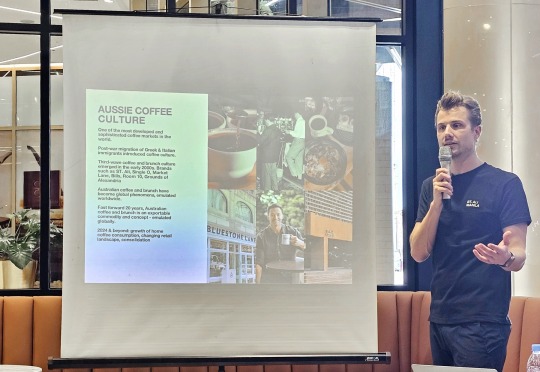
We were hosted by none other than Lachlan Ward, the CEO of ST. ALi Coffee from Australia. Lachlan introduced the brand and spoke about the values and drive that have led to their international success.

He also gave the guests a history of coffee culture in Australia as well as the different types of coffee and products they serve. They have a coffee called Magic which is an icon of Aussie coffee. This is a 3/4 full, double-ristretto based flat white which is uniquely Melbourne. It offers a balanced texture compared to traditional cappuccinos.


ST. ALi was brought to the Philippines by Stewart Ong, President of Butter & Salt Group Inc. which is the company that gave us M Bakery whose banana pudding I really love. Plans to bring ST. ALi in the country actually started in 2019 but was delayed due to the global pandemic. After 5 years, we finally have this new premium coffee place in Manila.

Now it's time to try some of the elevated brunch classics and new-wave signature iced drinks that make ST. ALi a renowned name in the world of cafes.

I ordered their Iced Latte which comes with a combination of espresso and milk. ST ALi sources their coffee beans from Brazil, Columbia, and Australia but they will also be introducing coffee blends sourced from local farmers.
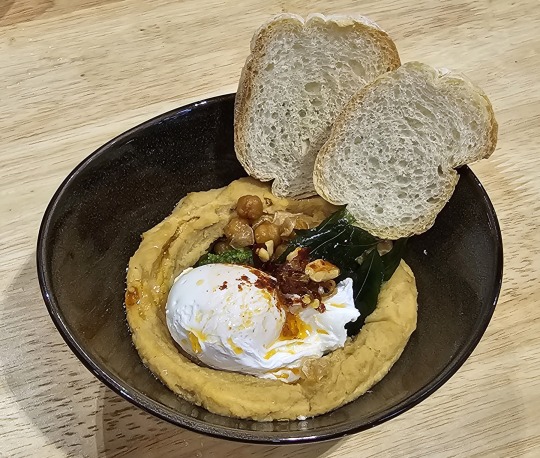
There were several interesting brunch items served for guests to try. The Hummus Breakfast comes with poached eggs, parsley pesto, crispy chickpeas, curry leaves, ST. ALi chili oil, and baguette.
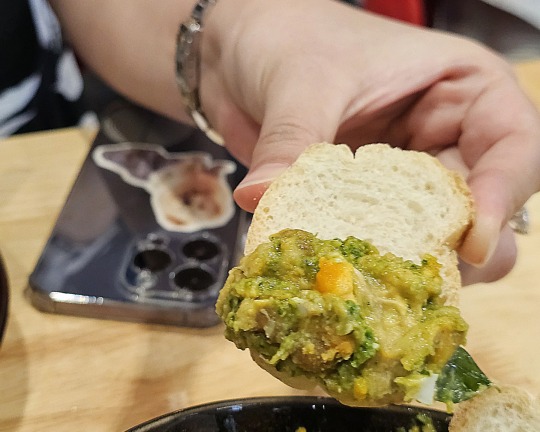
It's definitely a different type of breakfast meal with its curry flavors and a little spicy kick. This will really wake up your taste buds in the morning.

On the other hand, the ALi Granola has mango curd and passionfruit and is doused with cold milk. This is like eating cereals but is much much healthier.
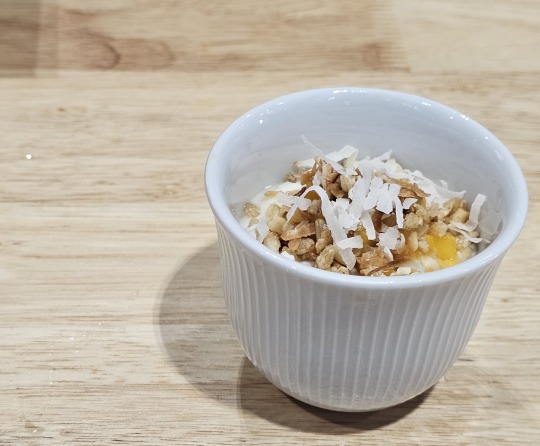
The Coconut Rice Pudding is a creamy coconut rice pudding with a hint of vanilla. This one is breakfast and dessert all rolled into one surprisingly delightful dish.

The brunch items were paired with some of their specialty drinks like the Coco Mingle which is a Coconut Iced Coffee. Sip and taste the top layer first before mixing it all together.


The Squid Ink Risotto is a heavier brunch dish for those who like rice with their breakfast. It is cooked with charred octopus, red grape and chili salsa.

There's also the Turkish Eggs which comes with poached eggs and served with peshwari naan, herb labneh, pepita and sunflower seeds, plus ST. ALi chili oil. This also has an explosive combination of flavors and spiciness that will surely kick start your morning.
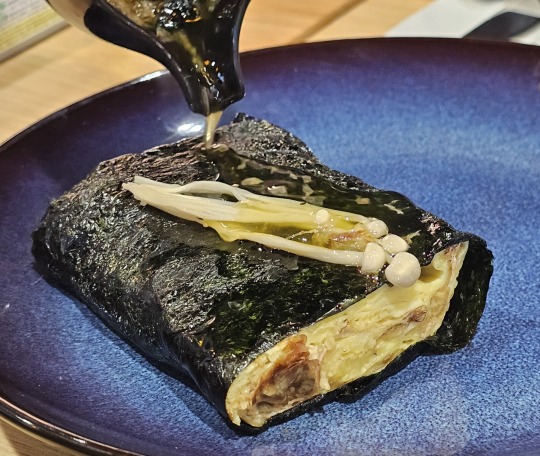
My favorite item that morning was the Tokyo Omelette. This pretty dish comes with fluffy egg omelette wrapped in nori and topped with bonito flake butter, pickled enoki mushroom, and smoked eel. I can definitely have this for lunch or even dinner.

Served together with the Tokyo Omelette was the Matchamansi, a vibrant and tangy matcha tonic prepared with calamansi. This was also my favorite beverage during the media launch with its vibrant Asian flavors.

For dessert, guests can choose from the various cakes and pastries on display at the counter. We had a sample of their strawberry cake, ube cake, and blueberry cake and they were all rich and delicious.

Customers can also bring home the ST. ALi experience by getting any of their coffee blends and preparing them at home.

ST. ALi formally opened its doors to the public on October 1, 2024 with special guests leading the ribbon cutting. Together with Stewart Ong and Candy Lu of Butter & Salt Group Inc. was Lachlan Ward, CEO of ST. ALi; Atty. Thomas de Castro, Quezon City District 4 Action Officer; and Faraday Go, Robinsons Land Corporation Executive Vice President. If you are a coffee lover and want to take your coffee experience to the next level, head over to ST. ALi in Opus Mall and indulge in the Aussie coffee culture right here in Manila.

ST. ALi Manila
G/F Opus Mall, Bridgetowne Destination Estate, Quezon City
www.stali.com.au
www.facebook.com/st.ali.manila
Instagram: STALi.ph
1 note
·
View note
Photo

KESEMPURNAAN IMAN Tanda bahwa iman seseorang disempurnakan adalah ketika engkau tidak lagi mendengar orang tersebut mengeluh ~Shaykh Hisham Kabbani ❤️ #AwliyaWisdom . Repost dari @hishamkabbani @NazemHisham _______ #ProphetMuhammad #salawat #Sunnah #Tariqah #ShaykhHisham #Naqshbandi #Nakşibendi #Naqsybandi #Qadri #Chishti #Saqibi #BaAlawi #Shadhili #Tijani #Mevlevi #habaib #AhlulBayt #ASWJ #Sufilive #islam https://www.instagram.com/p/CMHYKMKhIu8/?igshid=nsce5nnwbctt
#awliyawisdom#prophetmuhammad#salawat#sunnah#tariqah#shaykhhisham#naqshbandi#nakşibendi#naqsybandi#qadri#chishti#saqibi#baalawi#shadhili#tijani#mevlevi#habaib#ahlulbayt#aswj#sufilive#islam
0 notes
Text
Abu Ali ad-Daqqaq —rahimahullah— mengatakan: “Seseorang tidak akan mampu suluk di tarekat kaum sufi tanpa seorang guru. Sebab perjalanan ini menempuh kegaiban atau gaibnya kegaiban. Ibarat sebatang pohon apabila tumbuh dengan sendirinya tanpa ada orang yang menanamnya maka tidak ada seorang pun yang bakal memanfaatkan buahnya sekalipun tumbuh bersemi dan daunnya rindang, bahkan bisa jadi tidak akan berbuah untuk selamanya. Coba anda perhatikan wahai saudaraku, Tuan dari para rasul, Muhammad Saw., bagaimana dengan jibril yang menjadi perantara antara beliau dengan Tuhannya dalam menyampaikan wahyu. Dengan demikian anda tahu, bahwa menjadikan seorang guru adalah suatu keharusan bagi murid yang tidak bisa ditinggalkan.”
1 note
·
View note
Photo

Zaytun / olive & Abanus wood 99 tasbih Origin : Egypt Size : 10x7mm Order on WhatsApp +6285727371032 #tasbih #subha #misbah #masbaha #olivewood #abanuswood #olivetasbih #abanustasbih #egyptianWood #chapelet #Rosenkranz #tijani #shadhili #naqshbandi #prayerbeads #rosario #moslemprayerbeads #moslemtasbih https://www.instagram.com/p/B4XA6FWHe7O/?igshid=jzb0ix891uqm
#tasbih#subha#misbah#masbaha#olivewood#abanuswood#olivetasbih#abanustasbih#egyptianwood#chapelet#rosenkranz#tijani#shadhili#naqshbandi#prayerbeads#rosario#moslemprayerbeads#moslemtasbih
0 notes
Text

Whoever points you to worldliness has betrayed you.
Whoever points you toward action has exhausted you.
Whoever points you toward Allāh has given you sincere counsel.
— Imām Abu al-Hassan Ash-Shādhilī
6 notes
·
View notes
Photo

#kitap #tesavvuf #shadhili #love
1 note
·
View note
Text
ISLAM 101: SPIRITUALITY IN ISLAM: PART 117
The meaning of Tasawwuf
Last Part 12
Among the Sufis who aided Islam with the sword as well as the pen, to quote Reliance of the Traveller were: such men as the Naqshbandi sheikh Shamil al-Daghestani, who fought a prolonged war against the Russians in the Caucasus in the nineteenth century; Sayyid Muhammad ‘Abdullah al-Somali, a sheikh of the Salihiyya order who led Muslims against the British and Italians in Somalia from 1899 to 1920; the Qadiri sheikh ‘Uthman ibn Fodi, who led jihad in Northern Nigeria from 1804 to 1808 to establish Islamic rule; the Qadiri sheikh ‘Abd al-Qadir al-Jaza’iri, who led the Algerians against the French from 1832 to 1847; the Darqawi faqir al-Hajj Muhammad al-Ahrash, who fought the French in Egypt in 1799; the Tijani sheikh al-Hajj ‘Umar Tal, who led Islamic Jihad in Guinea, Senegal, and Mali from 1852 to 1864; and the Qadiri sheikh Ma’ al-‘Aynayn al-Qalqami, who helped marshal Muslim resistance to the French in northern Mauritania and southern Morocco from 1905 to 1909.
Among the Sufis whose missionary work Islamized entire regions are such men as the founder of the Sanusiyya order, Muhammad ‘Ali Sanusi, whose efforts and jihad from 1807 to 1859 consolidated Islam as the religion of peoples from the Libyan Desert to sub-Saharan Africa; [and] the Shadhili sheikh Muhammad Ma‘ruf and Qadiri sheikh Uways al-Barawi, whose efforts spread Islam westward and inland from the East African Coast … . (Reliance of the Traveller,863).
It is plain from the examples of such men what kind of Muslims have been Sufis; namely, all kinds, right across the board—and that Tasawwuf did not prevent them from serving Islam in any way they could.
To summarize everything I have said tonight: In looking first at Tasawwuf and Shari‘a, we found that many Qur'anic verses and sahih hadiths oblige the Muslim to eliminate haram inner states as arrogance, envy, and fear of anyone besides Allah; and on the other hand, to acquire such obligatory inner states as mercy, love of one’s fellow Muslims, presence of mind in prayer, and love of the Prophet (Allah bless him and give him peace). We found that these inward states could not be dealt with in books of fiqh, whose purpose is to specify the outward, quantifiable aspects of the Shari‘a. The knowledge of these states is nevertheless of the utmost importance to every Muslim, and this is why it was studied under the ‘ulama of Ihsan, the teachers of Tasawwuf, in all periods of Islamic history until the beginning of the present century.
We then turned to the level of Iman, and found that though the ‘Aqida of Muslims is that Allah alone has any effect in this world, keeping this in mind in everyday life is not a given of human consciousness, but rather a function of a Muslim’s yaqin, his certainty. And we found that Tasawwuf, as an ancillary discipline to ‘Aqida, emphasizes the systematic increase of this certainty through both mudhakara, ‘teaching tenets of faith’ and dhikr, ‘the remembrance of Allah,’ in accordance with the words of the Prophet (Allah bless him and give him peace) about Ihsan that “it is to worship Allah as though you see Him.”
Lastly, we found that accusations against Tasawwuf made by scholars such as Ibn al-Jawzi, and Ibn Taymiya were not directed against Tasawwuf in principle, but to specific groups and individuals in the times of these authors, the proof for which is the other books by the same authors that showed their understanding of Tasawwuf as a Shari‘a science.
To return to the starting point of my talk this evening, with the disappearance of traditional Islamic scholars from the Umma, two very different pictures of Tasawwuf emerge today. If we read books written after the dismantling of the traditional fabric of Islam by colonial powers in the last century, we find the big hoax: Islam without spirituality and Shari‘a without Tasawwuf. But if we read the classical works of Islamic scholarship, we learn that Tasawwuf has been a Shari‘a science like tafsir, hadith, or any other, throughout the history of Islam. The Prophet (Allah bless him and give him peace) said,
“Truly, Allah does not look at your outward forms and wealth, but rather at your hearts and your works” (Sahih Muslim, 4.1389: hadith 2564).
And this is the brightest hope that Islam can offer a modern world darkened by materialism and nihilism: Islam as it truly is; the hope of eternal salvation through a religion of brotherhood and social and economic justice outwardly, and the direct experience of divine love and illumination inwardly.
#allah#god#islam#muslim#quran#revert#convert#conevrt islam#revert islam'reeverthelp#revert help#revert help team#help#islamhelp#coneverthelp#prayer#salah#muslimah#reminder#pray#dua#hijab#]religion#mohammad#new muslim#new revert#new convert#how to convert to islam#convert to islam#welcome to islam
8 notes
·
View notes
Text
Gift for All Ahlus Sunnah Wal Jama’ah
Ahlus Sunnah Wal Jama’ah refers to Ash’ari or Maturidi in Aqeeda, Hanafi, Shafi,Maliki or Hanbali and Madh’hab, they respect Tasawwuf WAHHABIS ARE NOT AHLUS SUNNAH WAL JAMA’AH
Ijazah for any Sunni who accepts these,
Updated as of March 30 2023 with Additional Ijaza on Salawat Kanzul Haqaiq from Sayyiduna Shaykh Moulay AbdulKabir
Dalail Khairat with Ijazah(p.158) and Sanad,
Dalāʼil al-khayrāt wa-shawāriq al-anwār fī dhikr al-ṣalāt ʻalá al-Nabī al-mukhtār (Arabic: دلائل الخيرات وشوارق الأنوار في ذكر الصلاة على النبي المختار, lit. ‘Waymarks of Benefits and the Brilliant Burst of Lights in the Remembrance of Blessings on the Chosen Prophet’), usually shortened to Dala’il al-Khayrat, is a famous collection of prayers for the Islamic prophet Muhammad, which was written by the Moroccan Shadhili scholar Sayyiduna Shaykh Muhammad al-Jazuli ق (died 1465)
●Download here
Al Fuyudat Al Rabbaniyya Emanations of lordly Grace by Al Ghawth Sayyiduna Shaikh Abdul Qadir Jilani ق
●Download here
Al Kunuz An Nuraniyyah (Ahzab,Awrad,Adhkar of the Qadiri and Shadhili Tariqa) with Ijazah(p.604) and Sanad
●Download here
Dalail Khairat with Ijazah and Sanad from Sayyiduna Saykh Mahmud Ad Durra hafizahullah, a student of Sayyiduna Shaykh Muhammad Zakariyyah Al Bukhari ق
وقد أجزت بها كل من طلب الإجازة
كما أجازني سيدي الشيخ محمدزكريا البخاري رحمه الله
●Download here:
Ba Alawi Ahzab,Awrad,Adkhar and Salawat with Ijazah(check Biographies and Reference part) from Sayyiduna Habib Umar bin Hafiz hafizahullah wa qaddasallahu sirrahu:
●Download here
The name Ba’Alawi itself is a Hadhrami contraction of the terms Bani ‘Alawi or the Clan of ‘Alawi.
In the early fourth century Hijri at 318 H, Sayyid Ahmad al-Muhaajir bin Isa ar-Rumi bin Muhammad al-Naqib bin Ali al-Uraidhi ibn Ja’far al-Sadiq migrated from Basrah, Iraq first to Mecca and Medina, and then to Hadhramout, to avoid the chaos then prevalent in the Abbasid Caliphate
The name ‘Alawi refers to the grandson of Sayyid Ahmad al-Muhajir, who was the first descendant of Husain, Muhammad’s grandson, to be born in Hadramaut and the first to bear such a name.
KITAB SHAWARIQUL ANWAR
Abuya Sayyid Muhammad bin Alwi Al-Maliki said: “ Anyone who has my wirid book, means that he has received a Ijazah (permission to practice it). The Ijazah is not from me, but directly from the authors of the wird and ahzab
●Download
Ahzab,Awrad,Adhkad and Salawat of the Ja’fari Tariqa with Ijazah and Sanad:
Shaykh Salih al-Jaʿfari has given a general ijāza in all Ṣalawāt, so a murīd is free to recite any formula of Ṣalawāt.
As a general rule, the material we share on our various platforms come with a general ijaza from Shaykh Salih himself. (Ref: https://lightoftheazhar.com/seeking-permission/)
Download Here:
Kanz Al Nafahat
Kanz Al Saada
Jalibat al Faraj
Fatiha al-Aqfal and Dawat al-Yusr al-Qarib
Al Salawat Al Ja’fariya:
Ahzab and Adkhar with Ijazah from Sayyiduna Shaykh Muhammad Shareef bin Farid hafizahullah
To download these three supplications follow the following link:
●THREE SUPPLICATIONS AGAINST EVILDOERS THE ENVIOUS & ENEMIES
Download here
●A GIFT WHICH I RECEIVED FROM THE VIRTUOUS SAGES OF AFRICA:
In a state of ablution recite ten times per day for thirty consecutive days the following 12 Divine Names of Allah:
يَا اللَّهُ يَا بَرُّ يَا كَافِي يَا غَنِيُّ يَا فَتَاحُ يَا وَهَابُ يَا رَزَاقُ يَا كَرِيمُ يَا مُعْطِي يَا جَوَادُ يَا وَاسِعُ يَا ذُو الْفَضْلِ الْعَظِيمِ
“O Allah, O Dutiful, O Sufficient, O Independent, O Opener, O Giver, O Provider, O Generous, O Bestower, O Munificent, O Vast, O Possessor of tremendous bounty.”
YAA ALLAHU YAA BARRU YAA KAAFI YAA GHANIYU
YAA FATAAHU YAA WAHHAABU YAA RAZAAQU YAA KAREEMU YAA MU`TII YAA JAWAADU YAA WAASI`U YAA DHU AL-FADLI AL-`ADHEEMI
KANZ AL SAADAH WA AL RASYAD LI MAN FAQA AHL AL ZIYADAH WA AL UBBAD
With Ijazah and Sanad from Sayyiduna Shaykh Haji Muhammad Fuad bin Kamaludin
●Download here
Ijaza on the Adkhar of Idrisiyyah Tariqa:
●Download here
Dua Nasiri and Hizb Nasr with Ijazah and Sanad:
From Sayyiduna Shaykh Adnan Raja hafizahullah
In the words of Sayyiduna Shaykh Muhammad al-Yaqoubi hafizahullah, “The Nasiri Supplication contains amazing secrets for fulfilling needs and destroying oppressors.”
The chain of ijazah for this dua:
1. Shaykh Muhammad al-Yaqoubi from
2. Shaykh Muhammad al-Makki al-Kattani from
3. Ahmad b. Abi Bakr al-Nasiri (d.1337) from his father
4. Abu Bakr b. Ali (d.1281) from his father
5. Ali b. Yusuf (d.1235) from his father
6. Abu’l Mahasin Yusuf b. Nasir (d.1197) from his uncle
7. Abu’l Abbas Ahmad b. Muhammad (d.1129) from his father
8. Imam Abu Abd Allah Muhammad b. Muhammad (d.1085) — composer of this supplication.
●Download Dua Nasiri here (Essential Islam edition):
●Hizb al-Nasr here:
Hizb Nasr with Ijazah from Sayyiduna Shaykh Dr. Abdul Azeez Khatib Al Hasani
*حزب البحر للإمام الشاذلي رضي الله عنه* .
هذا وقد أجزت وأذنت لمن أحب قراءته من الإخوة أن يقرأه ليكتسب الإسناد المتصل مني الفقير إلى سيدنا الإمام الشاذلي قدس الله سره.
Hizb Imam Nawawi ق
With Ijazah:
حزب الإمام النووي
أجزت به من قبل الإجازة وقال : قبلت ،
وأرويه عن جماعة من شيوخنا قراءة وسماعا ، منهم سيدنا الشيخ محمد متولي الشعراوي رضي الله عنه ، بأسانيدهم إلى
الإمام النووي رضي الله عنه .
Hizib Falah
Oleh KH. Anwar Syafi’i
Pembina JRA.
Hizb Al Falahbof Sayyiduna Sheikh Hasan Asy Shadhili through Hadratussyaikh KH. M Hasyim Asy’ari with Ijazah
(خاصية)
فونيكا ويريدان حزب الفلاح للأستاذ الأكبر أبي الحسن الشاذلى رضي الله عنه. سينتن كع مداومهاكن ماهوس فونكا حزب بعد صلاة الصبح و بعد الصلاة العصر و عند ارادة النوم ان شاء الله تعالى كافاريعان كابكجان في الدنيا و الاخرة و أجزت لمن وقع هذ الحزب في يده وهو أهل للاجازة بحق اجازتي عن شيخنا العلامة محمد محفوظ بن عبد الله إسماعيل الجاوي ثم المكي عن السيد محمد امين إبن السيد احمد المداني عن الشيخ عبد الغني النقشبندي عن الشيخ إسماعيل بن الرومي ثم المداني عن الشيخ صالح الفلاني عن ابن سنة عن مولاي الشريف محمد بن عبد الله الوولاتي عن ابي عثمان سعيد قدوره عن سعيد بن ابن احمد المقري عن عبد إبن علي عن البرهان القلقشندي عن ابي العباس احمد بن محمد ابن اب بكر الوسطى عن الخطيب صدر الدين ابى الفتح محمد ابن احمد الميدومي عن ابى العباس احمد المرسى عن مؤلفه سيدي ابي الحسن على بن عبد الله ابن عبد الجبار الشاذلى الشّريف الحسانى رضي الله عن الجميع و نفعنا بهم و امدنا بأسرارهم و اعاد علينا من بركتهم امين
الفقير اليه تعالى:
محمد هاشم اشعرى-خادم العلم
●Check here:
Hizb Nasr with Ijazah from Shaykh al-Hadith Dr Yusri Rushdi Jabar (Lecturer, al-Azhar Mosque, Cairo Egypt
Hizb Bahr with Ijazah and Sanad from Sayyiduna shaykh Al Mukarrom Abuya KH. Miftachul Akhyar(Chairperson of the Indonesian Ulema Council)
Note before reading Hizb Bahr, dedicate one surah fatiha atleast to Sayyiduna Muhammad ﷺ and Imam Shadhili qaddasallahu sirrahu
Salawat Wahidiyyah with Ijazah
●Download here:
Lembaran Sholawat Wahidiyah
Ijazah Mawlid Barzanji and Sanad from Sayyiduna Shaykh Muhammad Husni Ginting al-Langkati hafizahullah
Faqir ila Allah Muhammad Husni Ginting bin Muhammad Hayat Ginting al-Langkati :
I received and narrate the kitab Mawlid Barzanji from Syeikh Saya al-Alim as-Shaykh Ahmad Damanhuri bin Arman al-Banteni who died at 1426 hijriyah, he narrates from his great teacher al-Allamah al-Muhaddis as-Shaykh Umar Hamdan al-Mahrisi at-Tunisi al-Madani who died1368 hijriyyah, he narrates from al Allamah Shaykh Sayyid Ahmad bin Ismail al-Barzanji Mufti Madh’hab Imam Syafi`i in Madinah, he narrates from his father Sayyid Ismail bin Sayyid Zaynal Abidin al-Barzanji, he narrates from his father al-Allamah Sayyid Zainal Abidin bin Sayyid Muhammad Abdul Hadi al-Barzanji, he narrates from his father al-Allamah Sayyid Muhammad Abdul Hadi al-Barzanji, he narrates from al-Allamah al-Faqih Syeikh Sayyid Ja`far bin Sayyid Hasan bin Sayyid Abdul Karim al-Barzanji, author of kitab ” Maulid al-Barzanji
Ijazah Mawlid Barzanji and Sanad from Sayyiduna Shaykh Muhammad Munirul Ikhwan
ﻗﺎﻝ ﺍﻟﻔﻘﻴﺮ ﺍﻟﺤﺎﺝ محمد ﻣﻨﻴﺮ ﺍﻻﺧﻮﺍﻥ ﺑﻦ ﺳﺒﻜﻰ ﺍﺳﻤﺎﻋﻴﻞ : ﺍﺟﺰﺗﻜﻢ ﺑﻘﺮﺍﺀﺓ ﻋﻘﺪ ﺍﻟﺠﻮﻫﺮ ﻓﻲ ﻣﻮﻟﺪ ﺍﻟﻨﺒﻲ ﺍﻷﺯﻫﺮ ( ﻣﻮﻟﺪ ﺍﻟﺒﺮﺯﻧﺠﻰ ) ﻟﻠﺴﻴﺪ ﺟﻌﻔﺮ ﺑﻦ ﺣﺴﻦ ﺑﻦ ﻋﺒﺪ ﺍﻟﻜﺮﻳﻢ ﺍﻟﺒﺮﺯﻧﺠﻰ
ﻫﺬﺍ ﻛﻤﺎ ﺍﺟﺎﺯﻧﻰ ﺷﻴﺨﻰ ( ١ ) ﻛﻴﺎﻫﻰ ﺍﻟﺤﺎﺝ ﻣﺤﻤﺪ ﺍﺣﻤﺪ ﺳﻬﻞ ﻣﺤﻔﻮﻅ ﻋﻦ ( ٢ ) ﺍﻟﺸﻴﺦ ﻣﺤﻤﺪ ﻳﺎﺳﻴﻦ ﺑﻦ ﻋﻴﺴﻰ ﺍﻟﻔﺎﺩﻧﻰ ﻋﻦ ( ٣ ) ﺍﻟﺸﻴﺦ ﺍﻟﺴﻴﺪ ﺯﻛﻰ ﺑﻦ ﺍﺣﻤﺪ ﺑﻦ ﺍﺳﻤﺎﻋﻴﻞ ﺍﻟﺒﺮﺯﻧﺠﻰ ﻋﻦ ( ٤ ) ﺍﺑﻴﻪ ﻣﻔﺘﻲ ﺍﻟﻤﺪﻳﻨﺔ ﺍﻟﻤﻨﻮﺭﺓ ﺍﻟﺸﻴﺦ ﺍﺣﻤﺪ ﺑﻦ ﺍﺳﻤﺎﻋﻴﻞ ﺍﻟﺒﺮﺯﻧﺠﻲ ﻋﻦ ( ٥ ) ﺍﺑﻴﻪ ﺍﻟﺸﻴﺦ ﺍﻟﺴﻴﺪ ﺍﺳﻤﺎﻋﻴﻞ ﺑﻦ ﺯﻳﻦ ﺍﻟﻌﺎﺑﺪﻳﻦ ﺍﻟﺒﺮﺯﻧﺠﻲ ﻋﻦ ( ٦ ) ﺍﺑﻴﻪ ﺍﻟﺸﻴﺦ ﺍﻟﺴﻴﺪ ﺯﻳﻦ ﺍﻟﻌﺎﺑﺪﻳﻦ ﺍﻟﺒﺮﺯﻧﺠﻲ ﺑﻦ ﻣﺤﻤﺪ ﺍﻟﻬﺎﺩﻱ ﺍﻟﺒﺮﺯﻧﺠﻲ ﻋﻦ ( ٧ ) ﺍﺑﻴﻪ ﺍﻟﺸﻴﺦ ﺍﻟﺴﻴﺪ ﻣﺤﻤﺪ ﺍﻟﻬﺎﺩﻱ ﺍﻟﺒﺮﺯﻧﺠﻲ ﻋﻦ ( ٨ ) ﻋﻤﻪ ﻣﺆﻟﻒ ﺍﻟﻤﻮﻟﺪ ﺍﻟﺴﻴﺪ ﺟﻌﻔﺮ ﺑﻦ ﺍﻟﺤﺴﻦ ﺑﻦ ﻋﺒﺪ ﺍﻟﻜﺮﻳﻢ ﺑﻦ ﻣﺤﻤﺪ ﺑﻦ ﻋﺒﺪ ﺍﻟﺮﺳﻮﻝ ﺍﻟﺒﺮﺯﻧﺠﻲ ﺍﻟﺤﺴﻴﻨﻲ
Sayyiduna Shaykh Muhammad Shareef bin Farid hafizahullah:
I give a general license (ijaaza `aama) to any Muslim who comes across this text, studies it and desires to be a part of the Golden Chain of the awliyya and `ulama cited in this seminal text; and who desire to share in the baraka of Shehu Uthman ibn Fuduye`.
Sayyiduna Shaykh Hamza Kettani hafizahullah:
Mawlid SimtudDuror, Khulasah Book of Sayyiduna Habib Umar bin Hafiz, Awrad,Adhkar and Salawat of the Ba Alawi Tariqa with Ijaza:
وعليكم السلام ورحمة الله وبركاته
لكم الإجازة من الحبيب المنصب علي بن عبدالقادر الحبشي
في قراءة وكتابة وحفظ مولد سمط الدرر لسيدنا الإمام الحبشي
وفي جميع كتب أوراد وأذكار الطريقة العلوية
Mawlid AdDiyaul Lami’, Khulasah Book of Sayyiduna Habib Umar bin Hafiz hafizahullah, Awrad, Adkhar and Salawat of the Ba Alawi Tariqa with Ijaza from Habib Muhammad Bin Hussain Al Habashiy
Our esteemed teacher ; (Abubakar Salim Smith/ Bakr Smith) Habib.Abubakar Bin Salim Bin Smith; has the “ijazah” / permission to teach and share Khulasah Maddad directly from Habib Umar bin Hafidz; and he has taught me and given me permission to share with everyone who wants to read the Ratib/Wirid/Hizb within this Cream of Remembrance: especially in these past days of worry for Muslims, globally or locally. I encourage reading this Hizb An-Nasr ( Imam Al-Haddad) everyday. Inshaallah, may Allah SWT accept our efforts and answer our prayers.
Ijazah in Dalailul Khayrat with Ahzab, Istanbul version
السلام عليكم ورحمة الله وبركاته
بسم الله الرحمن الرحيم
On the 14th of May 2022, the Singapore jammat hosted the Live Talk (arranged by the Royal Ottoman Society) with our beloved Shaykh Bahauddin. He blessed us with a Tablespread of Spiritual Nourishment that night.
During the Q&A session a mureed was asking if he had the permission to recite, other than the Dalailul Khayrat, Hizbul Wiqayah by Ibn Arabiق.
Shaykh Bahauddin revealed that he has been reciting it daily, in the Istanbul publication of the Dalailul Khairat, and has given Ijazah for everyone to practice the same.
All the Hizbs Shaykh Bahauddin reads are in the PDF attached above.
The 5 daily recitals in this book:
•Dalailul Khairat
•Hizbul A’ zham
•Hizbul Istighfar
•Hizbul Wiqayah
•Hizbul Ghoyath
Salawat Kanzul Haqaiq of the Hashimiyya Habibiyya Darqawiyya Shadhiliyya
Ijazah from the Murshid of the Tariqa Sayyiduna Shaykh Moulay Abdalkabir Al-Belghiti Qaddas Allahu sirrah ul-Aziz
و عليكم السلام ورحمة الله تعالى وبركاته سيدي
نعم لكم الإذن في ذلك سيدي
0 notes
Text
Abu al-Hasan al-Shadhili رحمه الله said,
Make piety (taqwa) your abode, and the delight of your selfish soul will do you no harm so long as it is discontent with its faults and does not persist in acts of disobedience nor abandons the awareness of Allah in solitude.
I say that being content with the self, persisting in disobedient acts, and abandoning awareness of Allah are the foundations of all illnesses, tribulations, and pitfalls.
11 notes
·
View notes
Text
A COMMON DISEASES AND POSSIBLE CURE: Part 2
The deed that brings rewards equivalent to those given for worship
Let us briefly consider the real sense of taking offense. Sometimes, the people around us might really behave in a way that causes us offense. Even in such situations, we should strive not to take offense, as a requirement of our belief in God and the Hereafter, in spite of ourselves and our own feelings. Let us not forget that deciding not to take offense where one normally would bring otherworldly rewards as if that person offered worship. Because, it is a state of battling against one’s carnal soul and rising up against one’s inner tendencies of transgression, where one gives his or her willpower its due. As it is known, Bediüzzaman mentions three main types of patience and one of them is patience against troubles and misfortunes. So it can easily be said that showing patience as we have described will bring the person otherworldly rewards to be gained by worship. We can sometimes face so many reasons to take offense. However, we need to see them as mere misfortunes and show due patience toward them. Even if somebody breaks relations with us, we should not. Even if they hurt us, we should not hurt another one. If others hurt us but we do not respond in the same way, act with certain flexibility, and find a way to give them a hug, then we will have made a very important sacrifice for the sake of faith and humanity; we will have enacted a very important virtue.
As for the social aspect of the issue, there are serious instances of taking offense, particularly between people who hold different worldviews and reflections of this situation in political life. Expectations of worldly gains as a high status add fuel to the flames. So much so that some people utter words they should not and make statements in conflict with the truth, and this leads to taking offense and harboring bitter feelings. If people do not act upon motives of seeking worldly status, it will be seen that there is a path and field for everybody to serve their people and humanity, and that there is a lane for everyone to run. As the members of a society, everybody can be on separate lanes but work for the common good, be hand in hand, and run toward the same target. This running does not include, nor should it include, a feeling of rivalry or considerations of “Let us leave them behind.” May be it should be a form of competing at good acts to make us say, “Let me not remain behind at doing goodness, let me present a performance no worse than those who run ahead of me.” Therefore, when the road is so wide, there will not be cases of touching, hurting, and offending one another. The same principle is true about sharing the beauties of faith and the Qur’an with others. God Almighty states: “Those (on the other hand) who strive hard for Our sake, We will most certainly guide them to Our ways (that We have established to lead them to salvation). Most assuredly, God is with those devoted to doing good, aware that God is seeing them” (al-Ankabut 29:69). That is, God will guide them to Himself through not one but many ways.
Bediüzzaman underlines the fact that “The roads leading to God are as many as His creatures’ breaths.” Given that this is the case, one can reach God through one way or another. If we give an example from Sufism, the ways of Naqshbandi, Qadiri, Shadhili, Rufai, Badawi, Khalidi and other orders all lead to Him. For this reason, differences should not be made into causes of harboring bitter feelings. It is necessary to avoid jealousy and rivalry on such issues and refrain from considerations as “They trespassed on our property.”
As believers, we need to be as soft and mild as can be toward our brothers and sisters; we need to cherish feelings and thoughts that can smoothly be swallowed without hurting the throat at all. We should be able to present these feelings and thoughts in the same mildness.
Even though breaking relations with a certain person owing to taking offense is very ugly behavior, it might sometimes happen between the altruistic souls who have dedicated themselves to truthful knowledge and humanity. For this reason, I envision great benefit in forming teams for the sake of eliminating ill feelings between people from different sections of the society and different walks of life. As Bediüzzaman puts it, agreement and unity constitute an important means for inviting Divine help. A relevant verse confirms this fact: “… God’s ‘Hand’ is over their hands” (al-Fath 48:10). That is, protection, help, and the graces of God are upon them. Concerning this verse, the noble Prophet stated “God’s hand is with the community.” At another instance, the Messenger of God, peace and blessings be upon him a millions times, stated: “Whoever wants to be right in the middle of Paradise, let him (or her) not dissociate from the community.”That is, let that person not fall into factionalism. One who breaks off with the community owing to taking offense, harboring bitter feelings, resentment, intolerance or a similar feeling, will distance oneself from God’s help as well.
There is nothing as “little”
Taking all of these into consideration, we can understand how great a disaster people’s breaking off relations with one another is, and what a virtuous act reconciliation is. Not dismissing any act of goodness as unimportant is essential in Islam. Sometimes, God Almighty may take people to the center of Paradise and let them enjoy the beauty of the Divine and experience feelings beyond imagination on the account of little acts of goodness they did. A hadith related to this fact states: “Be God-fearing and do not belittle anything from acts of goodness.” When we view things from this perspective, we understand that there is actually nothing that qualifies as little.
In another hadith where the Pride of Humanity refers to the same subject, behaviors such as smiling at another, saying a good word to that person, feeding a morsel to the mouth of one’s wife, and removing an obstacle that might inconvenience people passing are all considered among good acts (sadaqa) to bring otherworldly rewards. Accordingly, placing a stone to a hole on the road in order to save passing cars’ wheels from falling in or removing a thorn that might hurt people’s feet from a walkway are considered among acts of worship. It is not certain which of such seemingly little deeds will be a means for settling right in the middle of Paradise. Let me relate a true story about this issue. Caliph Harun Rashid’s wife, Zubaydah, was a great woman who carried out important services. At a certain period, pilgrims going to Arafat and Muzdalifa for their worship had to carry on their backs the water they needed. In the conditions of those days, she had waterways and fountains built from Mecca to Mina, Muzdalifa, and up until Arafat, thus committing a great act of goodness. By God’s grace, she provided millions of people with water to drink and make ablutions. God Almighty does not leave such a service unrewarded, of course. When I went to Hajj in 1968, I saw the fountains built thanks to that great woman. By making restorations, the Ottomans preserved that waterway for a long period. Those who saw that woman of such great service in dreams asked her how God treated her. Although she had done various good works, she told the deed that became the means of her deliverance thus: “One day the call to Prayer began to rise from the minarets. I told the people around me to be silent and listen. When I passed to the next world, they said ‘God forgave you because of this.’”
We never know how God values deeds that seem very little and simple to us in this world. We do not know which deed will become a means of gaining His good pleasure and a means of enjoying eternal bliss in Paradise. For this reason, we should try to carry out everything God commands, without discriminating between them as great or little.
#allah#god#islam#muslim#revert#convert#quran#ayat#religion#reminder#help#hijab#prophet#Muhammad#hadith#sunnah#pray#prayer#salah#muslimah#dua#convert help#revert help#islam help#muslim help#welcome to islam#how to convert to islam#new convert#new muslim#new revert
3 notes
·
View notes
Text
“O coffee, O people of love, you helped me dispel sleep, you helped me with Allah's help. To worship him while people slept, do not blame me for drinking it, it is the drink for the honoured ones.”
– Shaykh Ali Ibn Umar Ash-shadhili
10 notes
·
View notes